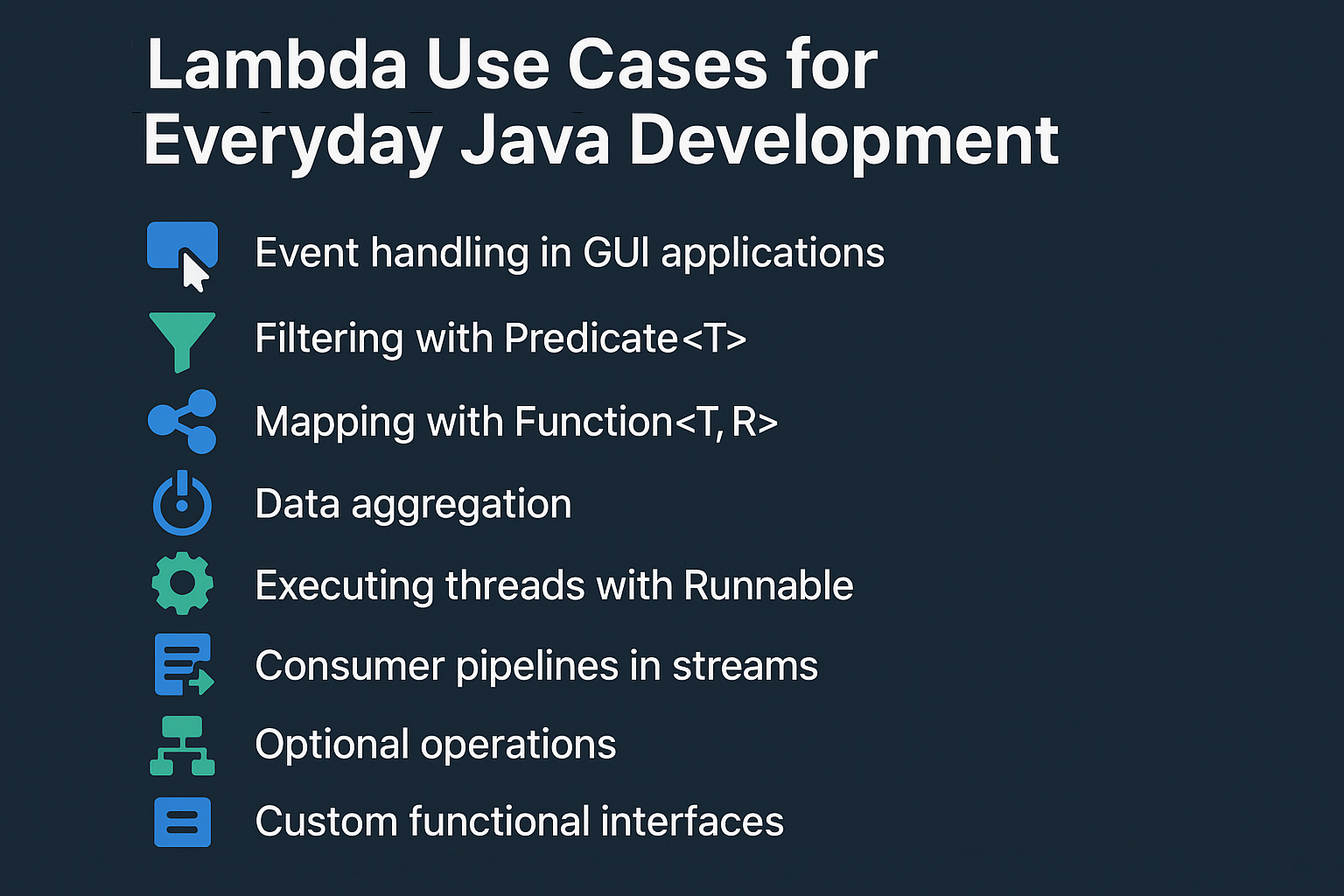Java lambdas have transformed the way modern Java applications are written. Introduced in Java 8, they allow you to pass behavior like data, making your code more concise, testable, and expressive. But where exactly do lambdas shine in day-to-day development?
In this tutorial, we explore the top 10 real-world use cases of lambda expressions, along with practical examples, best practices, and pitfalls to avoid.
🧠 What Are Lambda Expressions?
Lambda expressions are a way to create anonymous implementations of functional interfaces using a compact syntax.
(String s) -> s.length()
They are often used with functional interfaces like Function, Predicate, Consumer, and Supplier—all part of the java.util.function package.
🔟 1. Event Handling with Lambdas
In GUI applications (JavaFX, Swing), lambdas make event handling cleaner.
button.setOnAction(event -> System.out.println("Clicked!"));
Why it works: Lambdas reduce boilerplate for ActionListener, making code compact and readable.
9️⃣ Filtering and Matching with Predicate<T>
List<String> names = List.of("Alice", "Bob", "Charlie");
names.stream()
.filter(name -> name.startsWith("A"))
.forEach(System.out::println);
Real-world use: Validating inputs, filtering search results, applying dynamic rules.
8️⃣ Mapping and Transformation with Function<T, R>
List<String> names = List.of("Alice", "Bob");
List<Integer> lengths = names.stream()
.map(String::length)
.collect(Collectors.toList());
Use case: DTO conversions, formatting data, normalizing strings.
7️⃣ Data Aggregation with BinaryOperator<T>
List<Integer> nums = List.of(1, 2, 3, 4);
int sum = nums.stream().reduce(0, (a, b) -> a + b);
Use case: Summing values, calculating min/max, merging collections.
6️⃣ Lazy Initialization with Supplier<T>
Supplier<String> uuidSupplier = () -> UUID.randomUUID().toString();
System.out.println("ID: " + uuidSupplier.get());
Use case: Generating defaults, database connections, lazy loading.
5️⃣ Executing Threads with Runnable
new Thread(() -> System.out.println("Running in thread")).start();
Use case: Async operations, scheduling, concurrency patterns.
4️⃣ Consumer Pipelines in Stream API
List<String> data = List.of("a", "b", "c");
data.forEach(item -> System.out.println("Item: " + item));
Use case: Logging, transformations, UI rendering, messaging.
3️⃣ Composing Business Logic with andThen() and compose()
Function<String, String> trim = String::trim;
Function<String, String> toUpper = String::toUpperCase;
Function<String, String> composed = trim.andThen(toUpper);
System.out.println(composed.apply(" hello "));
Use case: Step-by-step transformations (e.g., input sanitization pipelines).
2️⃣ Optional Operations
Optional<String> name = Optional.of("John");
name.ifPresent(n -> System.out.println("Hello " + n));
Use case: Avoiding null checks, fallback logic, conditional executions.
1️⃣ Custom Functional Interfaces for Strategy Pattern
@FunctionalInterface
interface Strategy {
void execute();
}
public void runStrategy(Strategy strategy) {
strategy.execute();
}
runStrategy(() -> System.out.println("Executed!"));
Use case: Configurable behavior, test hooks, domain logic encapsulation.
⚠️ Pitfalls and Anti-Patterns
- Overuse of lambdas in deeply nested chains
- Ignoring checked exceptions (must be handled explicitly)
- Capturing mutable variables unintentionally
- Using lambdas where method references or named functions are clearer
📌 What's New in Java Versions?
Java 8
- Lambdas, functional interfaces, Streams API
Java 9
FlowAPI,Optional.ifPresentOrElse
Java 11
- Local variable inference in lambdas (
var)
Java 21
- Structured concurrency
- Scoped values
- Virtual threads + improved compatibility with functional code
✅ Conclusion and Key Takeaways
- Lambdas make Java code more expressive and modular
- They fit naturally into stream pipelines, async execution, and business logic
- Learn when to use and when to avoid lambdas—clarity matters
- Master functional interfaces (
Function,Predicate, etc.) to write cleaner Java
❓ FAQ
1. Are lambdas only for streams?
No. They work anywhere functional interfaces are used—threads, events, APIs, etc.
2. Can lambdas throw exceptions?
Not checked exceptions by default. Wrap with custom utilities or fallback logic.
3. Is it better to use method references?
When possible, yes. They are clearer and more concise.
4. Are lambdas garbage collected?
Yes. They are compiled into objects and managed by the JVM like any other instance.
5. Can lambdas access external variables?
Yes, but only if the variables are effectively final.
6. Should I unit test lambdas?
Yes, especially if they encapsulate business logic or complex transformations.
7. What is the performance impact of lambdas?
Minimal. JVM optimizes them via invokedynamic. But deep chains may affect readability.
8. Can lambdas be serialized?
Technically yes, but it's brittle. Avoid serialization unless necessary.
9. What's the best way to refactor to lambdas?
Start with replacing anonymous classes, then extract inline logic into named lambdas/functions.
10. Are lambdas thread-safe?
Lambdas themselves are stateless and safe, but shared state accessed inside them must be synchronized.
